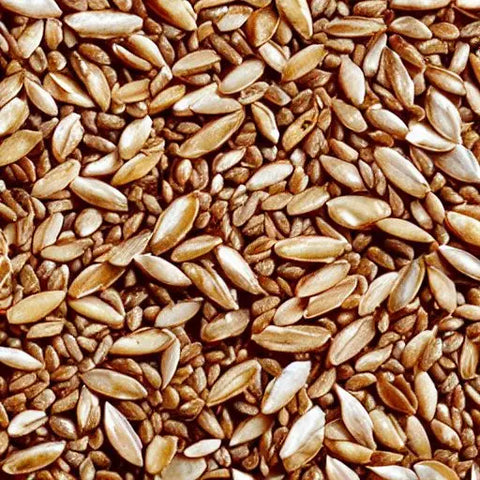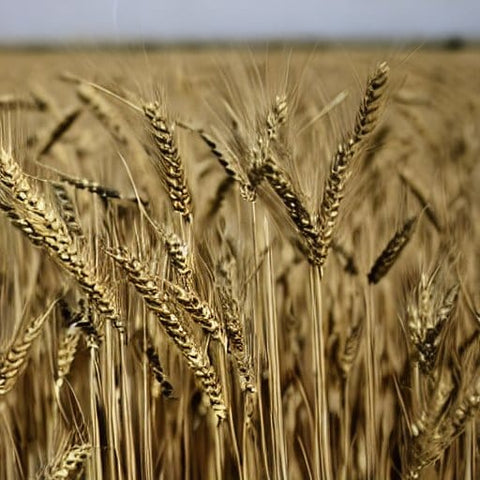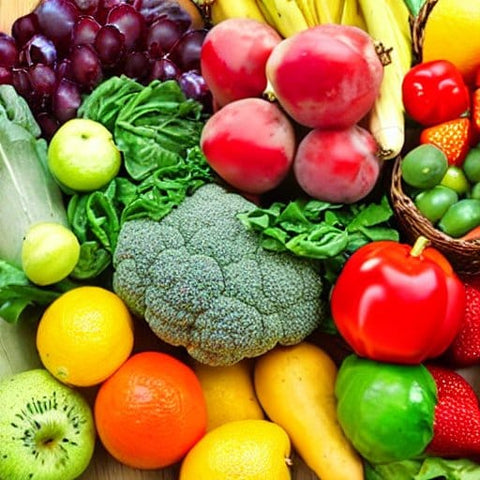Healthy Carbohydrates
If you want to consume a significant number of carbohydrates, you need to make sure you choose the appropriate kind. You will want to make sure that you are adhering to some straightforward recommendations if you want to ensure that the carbs you eat are nutritious. You should focus on eating foods that are high in simple carbs, such as beans, whole grains, fruits, and vegetables. You will be able to receive the necessary amount of energy this way without having to consume excessive amounts of sugary and processed foods.
Carbohydrates are said to be "healthy" when they have a low glycemic index and a high content of fiber, vitamins, and minerals. A food's glycemic index indicates how rapidly it causes an increase in the amount of sugar in the blood. Foods that have a low glycemic index are digested and absorbed more slowly, which results in a more consistent supply of energy.
Here are some healthy carbohydrates:
- Grains whole: Grains like oats, quinoa, barley, and brown rice are all examples of whole grains, and they are regarded as some of the healthiest forms of carbohydrates due to their high content of fiber, vitamins, and minerals. They also have a low glycemic index, which indicates that they are slowly digested and absorbed, making them an excellent source of continuous energy because of this. Oatmeal, quinoa, brown rice, barley, whole wheat bread, and pasta are all examples of whole grains.
-
Fruits and vegetables: Fruits and vegetables are healthy sources of carbohydrates since they are low in calories and abundant in fiber, vitamins, and minerals. Fruits and vegetables also include a very small amount of sugar. They also have a low glycemic index and are slowly digested, which results in a continuous supply of energy for the body. Apples, berries, oranges, peaches, pears, and plums are some examples of fruits.
Sweet potatoes, yams, squash, carrots, broccoli, and Brussels sprouts are some examples of vegetables. Vegetables that contain starch include maize, peas, green beans, parsnips, turnips, and beets are examples. - Legumes: Beans, peas, and lentils are all examples of legumes, which are a kind of complex carbohydrate that is beneficial to your health since it is high in fiber, protein, and minerals. They also have a low glycemic index and are slowly digested, which results in a continuous supply of energy for the body. Lentils, black beans, chickpeas, and kidney beans are all types of legumes.
- Dairy products: Products made from milk and other dairy cows Milk, yogurt, and cheese are examples of dairy products that are good sources of carbohydrates because they are high in calcium, potassium, and other vital elements. They also have a low glycemic index and are slowly digested, which results in a continuous supply of energy for the body. Greek yogurt, skim milk, and low-fat cheese are examples of dairy products.
- Nuts and seeds: Nuts and seeds are nutritious sources of carbohydrates because they are high in fiber, minerals, and good fats. They also have a low glycemic index and are slowly digested, which results in a continuous supply of energy for the body. Chia seeds, flaxseeds, almonds, and walnuts are some of the nut and seed options.
Forms that carbohydrates may take
Carbohydrates may be broken down into two primary categories: simple and complicated. Fruits, vegetables, and dairy products are all examples of foods that include simple carbohydrates. They provide an instant supply of energy as a result of the speed with which the body can break them down. Foods such as legumes, nuts, and seeds, as well as whole grains, are good sources of complex carbohydrates. They provide a more consistent supply of energy to the body since the body breaks them down at a slower rate.
Simple carbohydrates
There is a widespread misconception that simple carbohydrates are harmful to one's health, however this may not always be the case. Milk, fruit juice, and white rice are all examples of foods that include simple carbohydrates. Other examples include. In point of fact, they could assist your body in maintaining its equilibrium.
However, consuming an excessive amount of simple carbs might put one at risk for developing difficulties. For instance, they are capable of causing a sharp increase in the amount of sugar in the blood. This may have a role in the development of insulin resistance, which is one of the risk factors for developing type 2 diabetes.
If you are at increased risk for developing diabetes, maintaining a balanced diet is essential. Carbohydrates are an essential component of a diet that is healthful. Carbohydrates should make up between 45 and 65 percent of your total daily caloric intake at the very least. These carbohydrates are available in a wide range of forms, ranging from refined grains to legumes, and may be found in a number of foods. Carbohydrates come in a wide variety of forms, and it's important to choose the proper ones for your body. However, a health care practitioner may assist you in determining how much of each kind of carbohydrate you should consume.

You should take into consideration the total nutritional profile of the food you are eating when making decisions on the kinds of carbohydrates that you will consume. To determine if the meal you are consuming has a high or low glycemic index, you may determine this with the use of a tool that is known as the glycemic index. The glycemic index is a useful reference that may be used to determine how soon the consumption of a certain item will cause an increase in one's blood glucose level.
It is recommended by the American Heart Association that you keep your intake of added sugars to less than 6% of your daily calorie total. It is in your best interest to stay away from refined and processed meals, especially if they include added sugars. Instead, go for whole foods, which have a greater value in terms of their nutritional content.
The body's primary source of energy comes from the digestion and metabolism of simple carbohydrates. They are also beneficial to the digestive process. However, they may lead to an increase in body weight. In addition, they may produce a surge in your blood sugar, which can result in symptoms such as exhaustion, loss of appetite, and other issues.
The use of complex carbohydrates rather than simple ones is recommended. Those foods that are high in complex carbs also have a digestive process that is slower, which means that your blood sugar levels will remain more stable. In addition to that, they are packed with of various nutrients. You may improve the health of your digestive system and give yourself a burst of energy by include complex carbohydrates in your daily diet.
Grains that are whole
Consuming whole grains is one of the most beneficial things you can do for your health and should be a priority. They have been demonstrated to lower the chance of developing both cardiovascular disease and cancer, in addition to being a healthy source of fiber, carbs, and minerals.
Whole grains are a great source of carbohydrates that are good for you. Oats, quinoa, barley, and brown rice are examples of whole grains that are high in fiber, as well as vitamin and mineral content. They also have a low glycemic index, which indicates that they are slowly digested and absorbed, making them an excellent source of continuous energy because of this. Whole grains have been shown to help decrease cholesterol levels, lessen the chance of developing heart disease, and increase feelings of fullness, all of which may contribute to better control of one's weight.
It is also well recognized that eating whole grains may help reduce blood pressure, cholesterol, and weight. In point of fact, studies have shown that individuals who consume a diet that is higher in whole grains have lower levels of inflammation throughout their bodies. It's possible that this contributes in some way to the amazing health advantages offered by these meals.

The capacity of whole grains to keep you feeling full for longer is one of the most essential advantages of eating them. According to a number of studies, those who consume a greater amount of fiber have a higher satisfaction rate. It has also been shown that fiber assists in maintaining healthy glucose levels in the body.
It is also known that consuming whole grains may reduce the chance of developing heart disease and diabetes. If you want to know how soon a meal will effect your blood sugar, the glycemic index of that item is a helpful indication. Because they generate a rapid rise in blood sugar, carbohydrates that have a high glycemic index are generally not recommended as a healthy food choice.
Another benefit of whole grains is their capacity to increase the volume of meat and poultry when they are cooked with them. For instance, oats may be a wonderful replacement for dry breadcrumbs in many recipes. As a nutritious snack, you may make unsweetened oats by combining them with honey and maple syrup. You also have the option of using canned beans in place of soups that are based on meat.
Although there are certain drawbacks associated with ingesting whole grains, replacing refined white grains with whole grains may be an excellent approach to improve one's diet. You could choose to start your day with a whole grain English muffin and follow it up with a sandwich made with whole grains.
Wheat bulgur is a grain that is low in carbohydrates and rich in fiber. It also works well in soups and tabbouleh, among other dishes. It is particularly abundant in the heart-protective antioxidant avenanthramide, which helps keep the heart healthy.
Before you purchase any food, you should always check the ingredients list first. This goes for all kinds of foods. Be careful to choose the alternatives that are the healthiest and avoid the kinds that are processed or refined. Additionally, you should seek for foods that are enriched with certain nutrients. Folic acid and iron are two possible examples of this.
In addition, a diet based only on plants must to be supplemented with a copious amount of fruit and vegetables. A few nuts and seeds might be good to your health in tiny amounts. Additionally, legumes are a great source of protein.
Fruits and vegetables
In addition to being wonderful sources of nutritious carbohydrates, fruits and vegetables are also excellent food sources. They have a little number of calories but a significant amount of fiber, vitamins, and minerals. They also have a low glycemic index and are slowly digested, which results in a continuous supply of energy for the body. Eating a diet that is high in fruits and vegetables may assist in the reduction of the risk of developing chronic illnesses, as well as enhance digestion and boost general health.
Vegetables and fruits are the two primary food groups that contain carbs. These are rich sources of antioxidants, fiber, and vitamin content. In addition to this, they provide the essential fuel that your body need. To achieve a better sense of harmony among the foods on your plate, it is a good idea to have a wide selection of fruits and vegetables on hand.
Fruits and vegetables include essential vitamins and minerals that play a role in maintaining good skin and hair, warding off illnesses, and maintaining normal blood pressure. Many whole fruits and vegetables that have not been treated in any way are also regarded to be superfoods.
Our bodies can't function properly without carbohydrates. They are the key contributors to the body's energy supply. However, there are several types of carbs to choose from. Your body might benefit more from certain foods than from others.
Sugars and fiber make up the majority of carbohydrates in the diet. On the other hand, there are other, less evident kinds of carbohydrates that may be found in a variety of meals. These carbs can be found in a variety of foods. For instance, certain types of whole grains that have not been processed are fantastic sources of carbs.

Because fiber helps to decrease the absorption of sugar into the circulation, it reduces the spikes in blood sugar that might occur as a result of eating sugary foods. Grapes and spinach are two examples of foods that are high in fiber content and may provide several health benefits.
The fact that fruit is often low in calories is another another advantage of eating fruit. This indicates that you are free to indulge in a pleasure without compromising your diet in any way. In point of fact, it is suggested that ladies consume at least one cup of fruit on a daily basis.
It's likely that when you think of carbs, the first thing that comes to mind are sugary and sweet foods. However, fruits are also an excellent source of fiber. In addition, several fruits have a high naturally occurring content of antioxidants and polyphenols. It has been shown that polyphenols may neutralize free radicals.
It is essential to consume a wide range of carbs, despite the fact that carbohydrates make up a significant portion of most people's diets. You may ensure that your body obtains the appropriate quantity of nutrients by selecting nutritious food alternatives such as whole grains that have not been processed, fruits, and vegetables.
It is important to pay attention to the carbohydrate content of your diet if you want to either reduce your chance of developing diabetes or enhance your overall health. Some types of fruit have a greater quantity of carbs than others, despite the fact that most fruits include a little amount of starch. However, this does not indicate that you should gorge yourself on them.
Beans
To protect your cardiovascular health, beans are among the healthiest foods you can consume. Studies have indicated that bean eaters had a decreased chance of developing heart disease and a lower body mass index than those who do not consume beans. In addition to that, they are quite high with fiber, which is known to aid in weight loss.
In addition to having a low glycemic index, they are an excellent source of fiber, protein, and minerals. The consumption of legumes has been linked to a reduction in blood cholesterol levels, an improvement in digestive health, and a promotion of sensations of fullness, all of which may assist in the control of body weight.
Protein may be found in high quantities in legumes. Building muscle requires a lot of protein. Consuming meals that are rich in protein helps you feel full for a longer period of time and reduces the likelihood that you will overeat. Because they contain fiber, beans are beneficial for maintaining regular bowel movements and warding off digestive issues.

Antioxidants defend the body against the damage caused by free radicals; legumes are an excellent source of antioxidants. Additionally, they may assist in the management of excessive blood pressure and cholesterol levels.
People who consume a diet that is high in legumes have a reduced likelihood of getting type 2 diabetes. Beans, in addition to the health advantages they provide, may also be an excellent method to get a significant amount of nutrients into your diet. They are delicious both fresh and cooked.
It is essential to keep in mind that the amount of carbohydrates that are included in beans varies greatly depending on the kind of bean that is consumed. If you consume a diet that is poor in fiber, eating beans on a more regular basis may be beneficial. You should begin with a low dose and gradually work up to a higher one.
The diets of the majority of Americans are deficient in the amount of fiber they consume. However, it should not be difficult to locate further means of expansion. Simply include some into your soups, salads, or other meals.
There are two methods for cooking beans: on the stovetop or in a slow cooker. It is essential that the temperature be maintained at a low level in order to avoid them becoming mushy. In addition to that, wash away any surplus salt.
Additionally, beans are a rich provider of the mineral potassium. Approximately 21 grams of carbohydrates and 8 grams of dietary fiber are included in each serving size of a half cup.
Beans are a fantastic meal choice due to the fact that they are both low in calories and rich in protein. A vegetarian dish may benefit greatly from having them included in it.
Because of their low glycemic index, beans do not result in a rapid increase in blood sugar levels when consumed. They are also an excellent option for those who do not consume gluten in their diets.
Additionally, they are an excellent supplier of the mineral iron. Iron is a mineral that is necessary for the production of blood proteins as well as hormones and connective tissue. Beans also contain a kind of fiber known as soluble fiber. This makes the digestion of the protein and carbs in the beans more gradual, which is beneficial.
Items Derived from Dairy
Carbohydrates that are beneficial for you include dairy products like milk, yogurt, and cheese. They are an excellent source of calcium, potassium, and a variety of other vital elements. They also have a low glycemic index and are slowly digested, which results in a continuous supply of energy for the body. Products made from milk and other sources of dairy have been shown to have positive effects on bone health, blood pressure, and digestion.
Seeds and Nuts as Food
Additionally, nuts and seeds are good sources of nutritious carbohydrates. They are an excellent source of beneficial fats, fiber, and minerals. They also have a low glycemic index and are slowly digested, which results in a continuous supply of energy for the body. Nuts and seeds have been shown to boost heart health, reduce cholesterol levels, and encourage feelings of fullness, all of which may assist with weight control. Nuts and seeds are also rich in protein, fiber, and healthy fats.


















































Dejar un comentario